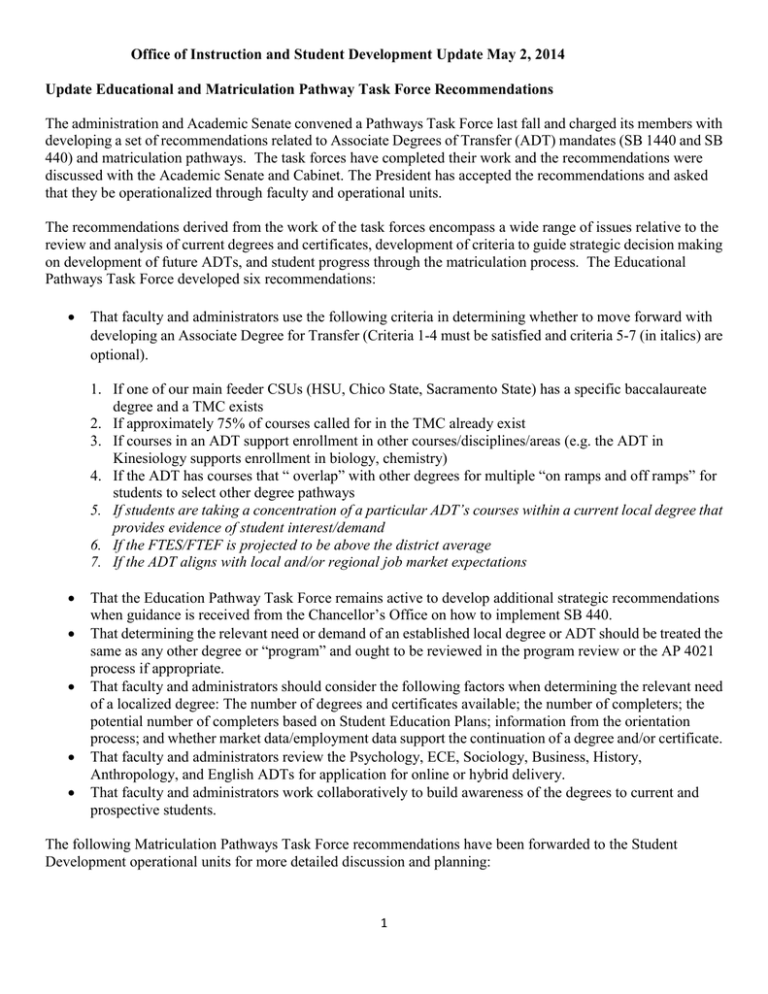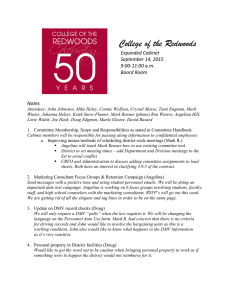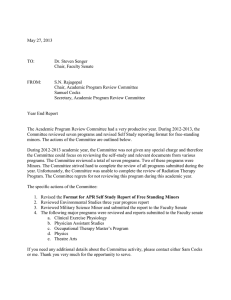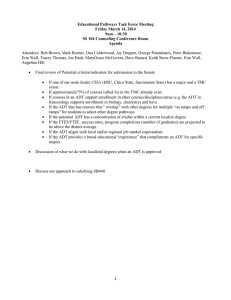Office of Instruction and Student Development Update May 2, 2014
advertisement

Office of Instruction and Student Development Update May 2, 2014 Update Educational and Matriculation Pathway Task Force Recommendations The administration and Academic Senate convened a Pathways Task Force last fall and charged its members with developing a set of recommendations related to Associate Degrees of Transfer (ADT) mandates (SB 1440 and SB 440) and matriculation pathways. The task forces have completed their work and the recommendations were discussed with the Academic Senate and Cabinet. The President has accepted the recommendations and asked that they be operationalized through faculty and operational units. The recommendations derived from the work of the task forces encompass a wide range of issues relative to the review and analysis of current degrees and certificates, development of criteria to guide strategic decision making on development of future ADTs, and student progress through the matriculation process. The Educational Pathways Task Force developed six recommendations: That faculty and administrators use the following criteria in determining whether to move forward with developing an Associate Degree for Transfer (Criteria 1-4 must be satisfied and criteria 5-7 (in italics) are optional). 1. If one of our main feeder CSUs (HSU, Chico State, Sacramento State) has a specific baccalaureate degree and a TMC exists 2. If approximately 75% of courses called for in the TMC already exist 3. If courses in an ADT support enrollment in other courses/disciplines/areas (e.g. the ADT in Kinesiology supports enrollment in biology, chemistry) 4. If the ADT has courses that “ overlap” with other degrees for multiple “on ramps and off ramps” for students to select other degree pathways 5. If students are taking a concentration of a particular ADT’s courses within a current local degree that provides evidence of student interest/demand 6. If the FTES/FTEF is projected to be above the district average 7. If the ADT aligns with local and/or regional job market expectations That the Education Pathway Task Force remains active to develop additional strategic recommendations when guidance is received from the Chancellor’s Office on how to implement SB 440. That determining the relevant need or demand of an established local degree or ADT should be treated the same as any other degree or “program” and ought to be reviewed in the program review or the AP 4021 process if appropriate. That faculty and administrators should consider the following factors when determining the relevant need of a localized degree: The number of degrees and certificates available; the number of completers; the potential number of completers based on Student Education Plans; information from the orientation process; and whether market data/employment data support the continuation of a degree and/or certificate. That faculty and administrators review the Psychology, ECE, Sociology, Business, History, Anthropology, and English ADTs for application for online or hybrid delivery. That faculty and administrators work collaboratively to build awareness of the degrees to current and prospective students. The following Matriculation Pathways Task Force recommendations have been forwarded to the Student Development operational units for more detailed discussion and planning: 1 That a process be developed where faculty are included in high school outreach functions and involved in faculty to student contact prior to registration. That the Deans and faculty work with Counseling to identify appropriate first semester class scheduling pathways. That faculty make students more aware of their programs via the General Studies (GS) 1, GS 6 and Guidance 8 classes. That the operational units begin operationalizing the model and identify gaps that require institutional support. The members of both task forces are to be commended for the time and effort they put into developing the recommendations. The Educational Pathway Task Force members included Jay Dragten, Peter Blakemore, Erin Wall, MaryGrace McGovern, Erik Kramer, Tracey Thomas, Joe Hash, Bob Brown, Mark Renner, Dan Calderwood, George Potamianos, Dave Bazard, and Angelina Hill. The Matriculation Pathway Task Force involved Bob Brown, Kathy Goodlive, Lynn Thiesen, Crystal Morse, Sheila Hall, Cheryl Tucker, and Angelina Hill. Announcing the 2nd Annual Student Success Summit We are pleased to announce that the 2nd Annual Student Success Summit is tentatively scheduled for September 18th or 19th on the Eureka campus. This summit is a collaborative event focusing on retention and persistence issues facing our district. The outcomes for the 2014 Student Success Summit include: Providing an overview of CR retention data and efforts to increase student persistence Building an understanding of why some students are at a greater risk of not succeeding Sharing current retention practices that support the persistence of students Enhancing partnerships between student development and instruction to increase student achievement Providing an outline for the development of individual, departmental and college action plans based on knowledge gained at the summit I encourage you to think about presenting a session that showcases what you’re doing individually or collectively as a department to support student retention and persistence. If you are interested in submitting a proposal, please contact Johanna Helzer at 707 476-4341. Update Distance Education We’ve made a lot of progress toward developing our Distance Education (DE) program. Starting fall semester, Mark Renner will assume the duties of the Director of Distance Education (100% release from faculty duties) and Mark Winter will serve as the Coordinator for Distance Education (50% release time). Both are one year appointments. The DE Committee, in consultation with the Academic Senate, is putting processes in place to help guide development of distance education including faculty training. The Leaning Management System (LMS) task force is working diligently to find an LMS that will better support our ability to deliver high quality education via distance education. Although our DE development progress is moving steadily forward, we decided to postpone submission of our DE Substantive Change Proposal to the ACCJC for approval until fall to ensure that we undeniably meet all of the ACCJC standards, policies, and requirements. A DE Substantive Change approval is required for all degrees and certificates with 50% or more of their courses offered as distance education. Our proposal identifies over twenty 2 degrees and certificates that currently meet this criterion. Angelina Hill, Mark Renner, Mark Winter, Wendy Riggs and I worked together to lay out a timeline that will guide the development and internal approval process for the DE Substantive Change Proposal (“Proposal”) to meet the ACCJC’s submission date. Draft Proposal written by Angelina Hill—June 2 to July 31 Draft Proposal reviewed and revised with Mark Renner and Mark Winter— June 2 to July 31 Draft Proposal reviewed by Academic Senate—September 5 and 19 Draft Proposal reviewed and commented on by Expanded Cabinet—September 18 Draft Proposal reviewed by Vice President Snow-Flamer—September 19 Draft Proposal possibly reviewed by Susan Clifford (ACCJC)—September 22-24 Final DE Proposal reviewed by President Smith—September 26-September 30 Final corrections made to the DE Proposal—October 1 Final DE Proposal sent to the BOT for information—October 7 Final DE Proposal forwarded to the ACCJC—October 8 The growth of our DE program is important to the District. Thank you to Mark Renner and Mark Winter for agreeing to help the District grow our DE program responsibly and with the highest regard to quality and sustainability. You will continue to receive updates on the progress of our DE program from Mark Renner. 3



